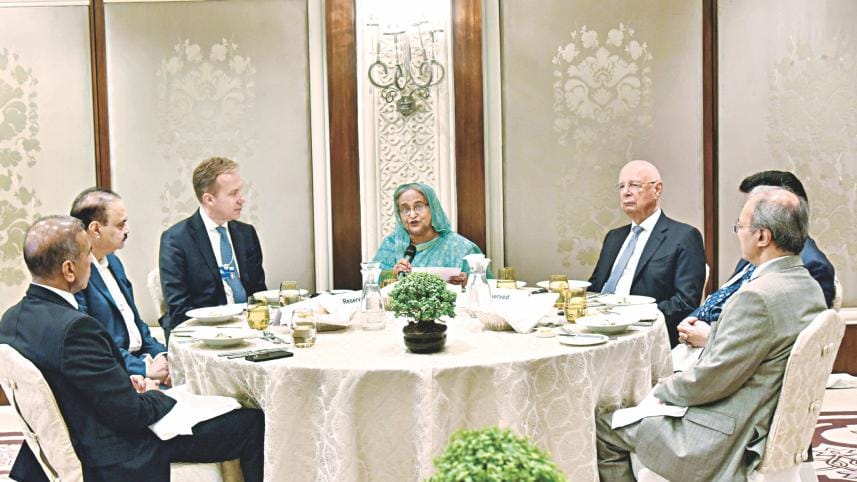Invest in Bangladesh

Prime Minister Sheikh Hasina yesterday urged the global investors, particularly the Indian entrepreneurs, to invest in Bangladesh’s potential non-conventional areas.
“It’s time for global investors, particularly the Indian entrepreneurs, to invest in Bangladesh in areas like education, light-engineering, electronics, automotive industry, artificial intelligence -- beyond the conventional menu,” she said.
The PM made the call while addressing the Country Strategy Dialogue on Bangladesh at the India Economic Summit 2019 of the World Economic Forum (WEF). She was the chief guest at the programme held at Hotel Taj Palace in Delhi.
She said Bangladesh deserves the attention of global and Indian businesses as a seamless economic space between eastern and northeastern India, south-east Asian countries and China.
“We can serve as the economic hub for the sub-region. Beyond our own 162 million people, Bangladesh can be the connecting landmass to a combined market of nearly 3 billion people,” Hasina said.
The PM said Bangladesh is moving fast to a high-value, knowledge-intensive society, beyond apparel manufacturing.
Bangladesh last year exported 12 industrial robots to Korea and four ships made in Bangladesh came to India, she added.
The premier said Reliance recently purchased a large number of refrigerators made in Bangladesh. Bangladesh also has six lakh IT freelancers -- the largest freelancing community.
“Today, Bangladesh offers the most liberal investment regime in South Asia in terms of legal protection of foreign investment, generous fiscal incentives, concession on machinery import, unrestricted exit policy, full repatriation of dividend and capital on exit, for example.”
Bangladesh is setting up 100 special economic zones, with one-stop service across the country. Twelve such zones were already functioning and two were reserved for Indian investors, the PM added.
She said a number of high-tech parks were also ready for technology and innovative enterprises.
Hasina said the HSBC last year predicted that Bangladesh would be the 26th largest economy in the world by 2030.
“Many see Bangladesh as a market of over 30 million middle- and affluent-class people and a ‘development miracle’. To me, our strengths are the societal values and people’s trust in Bangladesh.”
She said Bangladesh is becoming urbanised fast and about 48 percent of its population will live in towns and cities by 2030.
“Most of them will be young, energetic and digitally connected. They will be agile, receptive to new ideas and will look for new ways of creating wealth.”
In fact, this is already happening with over 110 million active internet subscribers in Bangladesh. By 2025, mobile internet penetration will reach 41 percent of the total population, the PM said.
She said over 30-million middle class people is indeed a huge market. “We have challenges like many other countries, but we know how to transform challenges into opportunities.”
Hasina said Bangladesh’s economy posted a record high growth of 8.1 percent in the last fiscal year.
“We are close to achieving double digit growth. Since 2009, Bangladesh economy has grown by 188 percent in size. Our per capita income is around $2,000.”
The PM said agriculture was no longer a subsistence sector. “Beyond self-sufficiency, we are now the fourth largest country in terms of rice production, second in jute, fourth in mango, fifth in vegetables and fourth in inland fisheries in the world. We are decoding genome of key crops and fruits to move further ahead.”
In transforming the country into “Digital Bangladesh”, Bangladesh since 2009 have ensured 100 percent ICT access for people at grassroots, she said, adding that her government’s focus is to use technology to solve people’s development challenges.
“As a result, Bangladesh has the fifth largest internet user population in the Asia-Pacific. We are moving fast towards a cashless society. Last year, e-commerce transactions reached $260 million.”
The PM said Bangladesh is continuously learning in its journey to development. Bangladesh offers business entrepreneurs a stable and humanitarian state, where leadership is responsive and responsible.
PM’s Private Industry and Investment Adviser Salman F Rahman and WEF President Borge Brende also spoke at the programme, among others.
Earlier in the day, Hasina reached New Delhi to join the World Economic Forum (WEF) Summit and hold meetings with top Indian leaders.
A red carpet was rolled out for the PM at Palam Air Force Station. Indian State Minister for Child and Women Development Debasree Chaudhuri received her.



 For all latest news, follow The Daily Star's Google News channel.
For all latest news, follow The Daily Star's Google News channel.
Comments